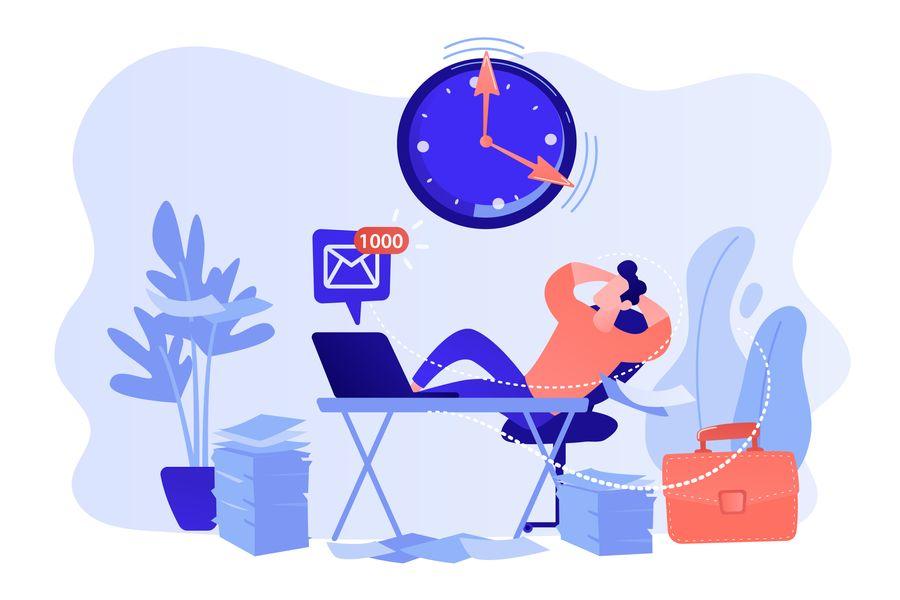It certainly isn’t easy to run your own business. One minute you could be busy marketing your business, the next you’re crunching the numbers as an accountant. The list of to-dos never seems to shorten, and the work hours you rack up get longer and longer. In my experience, many problems usually boil down to being so busy that organization slips or just plain goes out the window!
That’s when an entrepreneur’s arch-nemesis can strike, no matter how passionate you are about your work or your industry. Writer Edward Young called it “the thief of time”, businesswoman Barbara Corcoran called it “the enemy of success”, it is, of course, procrastination.
Why do we procrastinate?
Even the most organized and disciplined people procrastinate at one point or another. This isn’t due to being lazy or not committed to your job. The answer lies deep in the hard-wiring of every human brain.
Scientists have explained procrastination as the result of a battle between two areas of the brain when faced with “boring” tasks, the prefrontal cortex, which is responsible for planning, predicting, and personality development, and the limbic system (also referred to as your “lizard brain”), which is responsible for your survival instincts, the fight or flight response, and pleasure-seeking.
So as a busy entrepreneur working hard to build their business, there could be many areas in which you need to work, but not all tasks may feel as worthwhile as others. For example, you might love sitting down and planning ideas for strategies, but the thought of admin jobs fills you with dread. Your prefrontal cortex knows that completing admin tasks is important, but it is much newer (and weaker) than the limbic system, which is far from thrilled at the prospect of doing something it doesn’t enjoy. This is when you’ll find yourself saying “I’ll do it later/tomorrow/next week”.
But inevitably, “later/tomorrow/next week” can end up further and further away, and tasks piling up can lead to working increasingly long hours in an attempt to get everything done, or feelings of stress, anxiety, or guilt at not keeping on top of everything.
If this sounds like you, don’t worry, you are not alone! At Time etc, we believe over-long working weeks, burnout, and overwhelm should be a thing of the past, so here are five tried-and-tested methods that you can put into practice today, and see if they work for you.
1. Be Mindful
Beating the habits of millions of lifetimes (thanks to human evolution) might seem much easier said than done when it comes to overcoming the actions of the limbic system. But the simplest way is arguably one of the most effective.
Other than being older and stronger, the main reason why the limbic system tends to win over the prefrontal cortex is that all its actions and reactions are automatic. When you touch something hot, you don’t have to think about moving your hand away. In the same way, sometimes we don’t even realize we’re procrastinating until we’ve already started.
Simply being more aware of what we’re doing in the moment can not only make it easier to spot when we’re procrastinating, as it takes much of the “automatic” away from the process but see how detrimental it is to our productivity.
2. Prioritize
Sometimes, knowing what not to do is as important as what you want to do each day.
You may be familiar with “blank page syndrome” for writers or “blank canvas paralysis” for artists, where an empty page can be so daunting it feels impossible to know how to begin. I’d say the opposite can be true too! A full page of tasks can be so overwhelming to look at and try to work through.
If you set yourself too many priorities for the day, it’s unlikely you’ll be able to complete them all. Then everything you couldn’t get through that day will roll over to the next day. Combine that with your usual tasks, and a vicious cycle is created where things don’t get done and you never feel on top of your work.
The trick to staying on track is to handpick a small number of jobs you must complete by the end of the day. Impact-score each task and base the priority on how time-sensitive the task is and what its impact is on your business. Then, complete them in order of highest to least priority. Don’t fall into the trap of thinking that the most time-consuming tasks are automatically more important than tasks with less labor involved, and don’t forget your “boring” tasks too! Balancing your to-do list into more easily digestible lists each day will make your workload seem less overwhelming, and therefore, quicker and easier to start and complete. Any extra work or additional tasks you can complete beyond that is a bonus!
Another tip that we have found very helpful for optimizing to-do lists even further, is to highlight the top task in a different color so your eye is immediately drawn to it. When you’ve completed that task, highlight the next one. This way, you always know instantly what it is you should be working on whenever you glance at your list.
3. Batch Your Tasks
At the end of your working week, sit down and go through all of the work you know you’ll have to get through and the jobs you need to complete. Write them all down and begin batching them, collating them into groups so all similar work is in its own group.
The following week, work through each group in turn so you’re not jumping from one task to a completely different one, and back again, as this can skew your focus. According to some studies on multitasking, the brief mental blocks created when shifting between tasks can cost up to 40% of your productive time. So for example, one day could look like this:
- Working through your email inbox first thing in the morning
- Spending the rest of the morning on admin duties, like processing invoices, placing orders, etc
- Blocking out your afternoon for marketing tasks, like scheduling social media posts and responding to comments
4. Dopamine Rewards
Dopamine is a neurotransmitter in the brain that’s associated with pleasure, reward, and motivation. The happiness you feel when hugging your loved ones? The satisfaction you feel from eating your favorite food? That’s dopamine at work, and it’s created in the limbic system.
If you find that the lack of mental satisfaction or reward from completing certain tasks is the biggest obstacle to being productive, there is a simple trick that can help retrain your brain. If a task doesn’t provide you with dopamine, schedule something immediately afterward that does trigger that feel-good chemical. Whether that’s a coffee break, a walk outside, or listening to your favorite music, providing yourself with the “reward” that you wouldn’t get normally is a highly effective way to ensure those tasks don’t get put off any further.
5. Hire a Virtual Assistant
Dopamine rewards may help you complete tasks you used to procrastinate, but what happens when the demands of your growing business mean there is too much on your plate and the quality of your work, your personal relationships, or your mental health is starting to suffer?
A virtual assistant is an easy, cost-effective, and flexible solution for making your workload more manageable. Those repetitive, mundane tasks that seem to eat away at all your time? As boring as those tasks might be, they have to be done to keep your company running, but they can easily be delegated to a virtual assistant.
Early on, delegating won’t be easy, especially if you’re used to doing everything yourself. But once you’re up and running with the right assistant, you’ll be surprised at just how organized and efficient you become. Not only that, but finally having time to focus on growing your business will help you achieve so much more.
Being a successful entrepreneur in a fast-paced, ever-changing world is no mean feat, but you shouldn’t have to sacrifice your mental health or your personal relationships to pay for your success. Taking these steps has the potential to make an immeasurable difference in your professional life, and you’ll see the benefits trickle down to your everyday happiness too, so why not give them a try and see how you get on.







